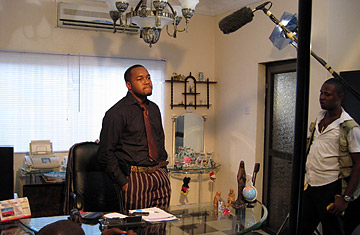
Nonso Diobi plays Conrad, a rich businessman, in an upcoming Nigerian film, August 26, 2009. The Nigerian film industry, known as Nollywood, has grown into a $250 million business in less than two decades.

This post is in partnership with Worldcrunch, a new global-news site that translates stories of note in foreign languages into English. The article below was originally published in Die Welt
BENIN CITY — "Where's the damn key?" The meter is ticking on the set of "Behind Closed Doors II," the sequel of a major Nigerian box office hit. Director Lancelot Oduwa Imasuen paces restlessly back and forth in front of the villa in this southern Nigerian city. Filming should have started by now. Oduwa is small and muscular, and wears a chain with a cross around his neck. Waving his arms around, he barks into his cell phone: "Where the hell are you? Do you know how much this is costing me?" His booming voice can be heard above the din of city traffic.
Twenty people are standing around waiting, some of the best-known actors in the country among them. But nothing doing; the gates to the villa remain locked.
The director has five more scenes to shoot before this, his 105th film, is in the can. Imasuen is one of the superstars of Nollywood, as the Nigerian film industry is known. But even superstars in Nigeria have days when chaos gets the upper hand. The owner of the villa with the huge fake marble columns flanking the entrance is an Edo state government minister who, as it turns out, just lost his job. There had been some irregularities in the cabinet, and the governor fired the lot of them. And it had to be this morning.
Another hour goes by before the official's son finally shows up. Imasuen herds everybody through the gates and, after a short prayer, yells: "Action!"
Anyone who really wants to understand the hardships, dreams and ambitions of the people of Nigeria should take in one of Imasuen's movies — or one of the other 600 films made in Africa's most populous country every year. In terms of quantity, this makes Nigeria's film industry the second largest after India's. The Nigerian industry turns over about 200 million euros annually and, after the public sector, is the country's second largest employer. (The oil industry brings in a lot more money but creates relatively little employment.) Love and betrayal, good and evil
Nollywood movies are most often made on a budget of about 10,000 euros. They tell gripping stories about love and betrayal, upward mobility, or the power of good over evil. The actors are a mixed bag, some experienced, some not, with editing done on a laptop, and the result is souped-up with special effects reminiscent of 1950s Hollywood B movies.
Making movies like that was the way Imasuen got his start too — before becoming one of Nollywood's "Big Men." His movie "Close Enemies" cost over 200,000 euros and is one of the biggest productions in Nigerian movie history. But yesterday is yesterday, and now he's putting all his energy into "Behind Closed Doors II," starring Richard Mofe Damijo, or RMD as he's known, one of Nollywood's top earners — actors like him are more than 10,000 euros per movie.
The director describes the plot this way: "An impotent husband asks his unmarried brother to get his wife pregnant. He later changes his mind — but by that time, his wife is already expecting. The husband becomes obsessed with the idea that she is carrying a bastard, and shoots her." According to Imasuen, no sequel was originally planned, but was launched after the original film's huge success.
The story continues: "Miraculously, no one dies, and a DNA test reveals that the baby is actually the husband's. He's not impotent after all!" In front of the villa, under the midday sun, one scene after another is being filmed. The two brothers exchange heated words, and at one point a suitcase flies through the air. In a nearby parking lot, other actors sit on plastic chairs learning their lines.
Imasuen is all over the set, with the actors, the cameramen, the writer, waving his arms around. "Cut! That was good," he croaks. "Now get the other actors." On it goes, until the time lost that morning has been recouped, and everybody takes a break.
"We tell stories Nigerians can identify with," Imasuen says. "Unlike Hollywood movies, ours don't always have a happy end. The world's not fair, so why should we pretend it is?" The quality of Nigerian movies has been getting better in recent years, there are more actors, and new movie theaters are being built.
The industry is in dire need of investment, however; presently, it self-finances through cable deals and street sales of DVDs. Churches often finance films to spread their message and many production companies are happy to take their money, particularly as competition is getting stiffer from countries like Ghana.
But the biggest problem is pirating. Only one in ten DVDs is sold legally. For as little as a US dollar, you can get the latest films on Lagos's congested streets. Pirated films are even shown on TV. The problem keeps foreign investors away. But Nigeria's president, Goodluck Jonathan, has pledged 130 million euros to try to tackle film piracy.
By evening, all five scenes are in the can; the film's pretty much done, Imasuen says. "After it launches, I only have a couple of days to get my costs back — after that, there are too many pirated copies out there." But by that time his thoughts will be on something else anyway: like casting his next movie.
Also from Worldcrunch:
Bangkok Is Sinking: Thai Capital Risks Washing Into The Sea
— Le Monde
Amsterdam Decides It's High Time To Squash Its Squatters
— Le Monde
A Rare Glimpse Aboard One Of France's Silent But Deadly Nuclear Submarines
— Le Monde
